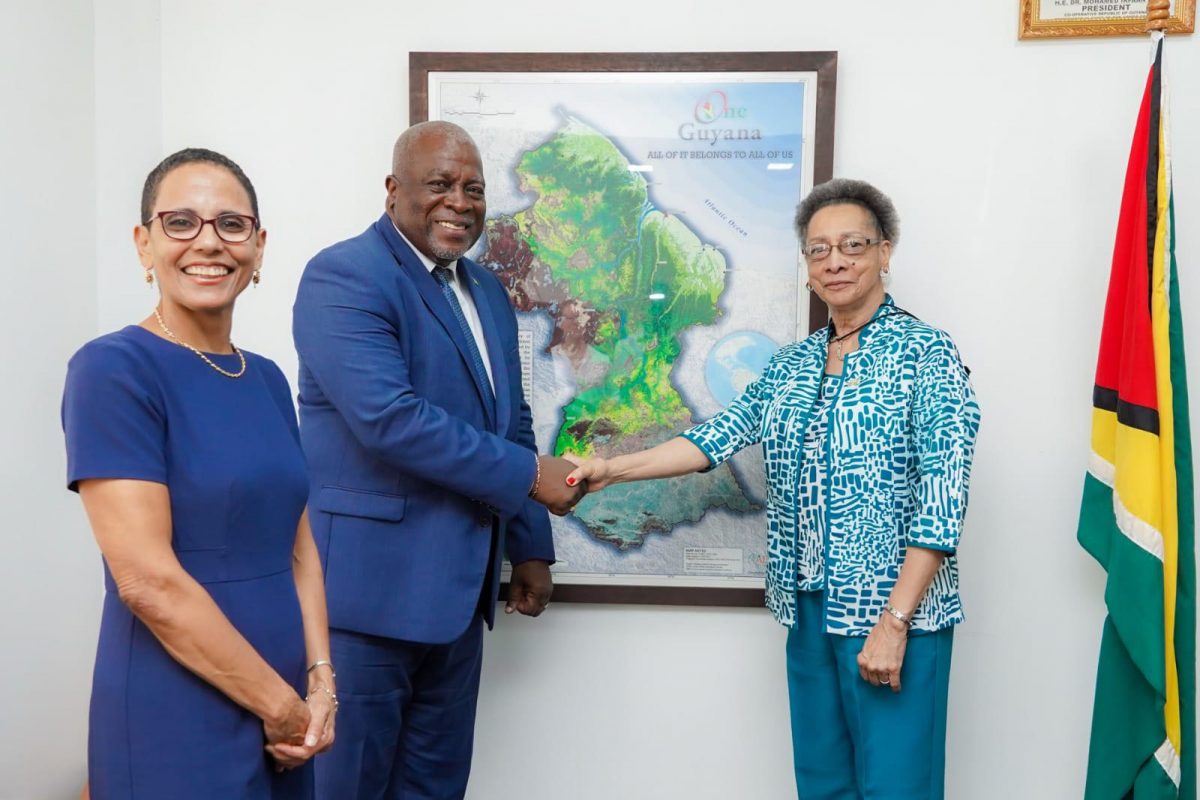Prime Minister Mark Phillips, who is currently performing the duties of President, has assured a regional human rights body that the Government of Guyana does not practice discrimination and abides fully by the country’s constitution in this regard.
Phillips made this declaration when he met on Tuesday with a visiting delegation from the Inter-American Commission on Human Rights (IACHR), at the Office of the Prime Minister (OPM) on Camp Street, Georgetown, a release from OPM stated.
In his remarks, the Prime Minister pointed to Guyana’s constitutional commitments to safeguarding the rights of all citizens equally. “I can assure you that we have a constitution – the Guyana Constitution – and enshrined in our constitution is the respect for rights of all majorities and minorities in the Guyanese society.
“As a government, we practice no acts of discrimination.”
The IACHR representatives were led by its president, Commissioner Margarette May Macaulay; and included Second Vice-President, Commissioner Roberta Clarke; Senior Advisor, Caribbean Affairs, Paul Spencer; Specialist (Technical Cooperation and Public Policies), Wendy Singh; and Press and Communications Official, Ana Paula Suarez.
In briefing Phillips on their visit, Commissioner Macaulay said that it represents a “vital element” of the IACHR’s regional engagement approach which was initiated in January 2023. Since then, the Commission has pursued technical cooperation trips focussed on best practices and evaluating human rights challenges from the perspective of government and civil society. The objectives, they stated, are to establish cooperation agreements, prioritise ratifying rights instruments and deliver training on the Inter-American framework.
According to the release, the Prime Minister outlined the administration’s comprehensive policies and strategies pertaining to the foundational pillars of inclusiveness and non-discrimination across all rights. This, he explained, encompasses Indigenous peoples’ rights, protections for the elderly, and persons living with disabilities, among other minority and majority groups.
“So, we have respect for human rights, respect for the rule of law, both international law and laws indigenous to Guyana. Inclusivity is very important.
We have a country of six different ethnic groups, so, the whole issue of being inclusive is important to us. Our government, in our manifesto, we made it clear that once we win this election, we don’t care who you voted for, we are bringing development to everyone, every community.”
Emphasis was also placed on the government’s prioritisation of three key policy areas – climate security, energy security and food security.
Phillips noted Guyana’s acute vulnerability to intensifying climate change impacts and the resultant need to boost resilience and preparedness capabilities. The need to access climate adaptation funding was also raised as essential for infrastructure hardening and community readiness systems.
Regarding energy security, the Prime Minister pointed out that policy goals are in balance as they aligned with both energy security and climate security interests. This, he said, includes working towards 60 per cent renewable energy integration by 2030, alongside the utilisation of natural gas as a transitional fuel source.
And on food security, he spoke of Guyana’s thrust to become the leader in food security in the region with its increase in production and productivity for sustainability. He also noted the regional challenges related to food security and the Caribbean Community’s (CARICOM) effort to decrease its food imports by 25% by 2025. Meanwhile, on the domestic front, a hunger-free population was listed as a key human rights aim underpinning the country’s central food security policy ambitions. He also discussed the policies and efforts to bridge the information communication technology divide in education and e-health.
The Prime Minister posited that IACHR’s visit will “galvanise accelerated progress” across the outlined areas to bring Guyana’s institutions and policies up to date with the latest human rights standards and best practices.
The broader IACHR delegation’s engagements in Guyana started on November 28 and will go up to tomorrow.
The IACHR was recently involved in human rights issues here after the north west community of Chinese Landing sought precautionary measures against miners in the area.
On July 21, the IACHR issued Resolution 41/2023, through which it granted precautionary measures in favour of members of the Indigenous Carib Community of Chinese Landing, who it said are “currently at serious, urgent risk of suffering irreparable harm to their human rights”. The government has since responded to the report.




